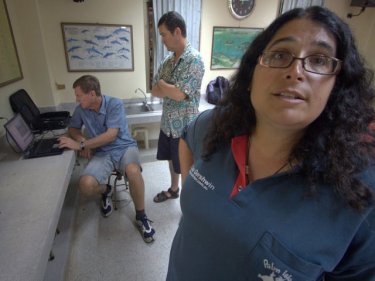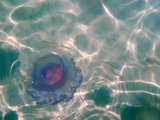No confirmation has yet been made of a British woman's account of a jellyfish sting she says occurred earlier this year somewhere in the Phuket holiday region.
The account by holidaymaker Sam Webster, 37, appeared in the Daily Mail online, world's most popular news site. Apart from Ms Webster naming Phuket as the place where she received hospital treatment for a week, the article was short on specifics.
Dr Lisa-ann Gershwin, Director of the Australian Marine Stinger Advisory Services, was brought to Phuket in 2009 amid concerns that dangerous box jellyfish were becoming more prevalent in the region.
Jellyfish of all types continue to grow as a problem in warmer waters almost everywhere, with Gibraltar's government now considering installing jellyfish exclusion nets and dangerous box jellyfish being sighted off Malta.
Since 2009, some beach managements in the Phuket region extending south to Malaysian destinations and east to the Gulf of Thailand have taken a proactive approach, posting warnings and setting up sting treatment stations.
Other holiday destination health and safety administrations continue to ignore the issue.
The Phuket Marine Biological Centre for a time became the source for research and information on the prevalence of jellyfish throughout the entire region.
However, little has been made public about the spread or the containment of the potentially deadly box jellyfish species since Dr Gershwin's visit.
A PHUKETWAN team endured a close encounter with Phuket's interesting native jellyfish at an east coast bay where small non-deadly jellyfish still breed.
Phuket Box Jellyfish: Are We In Danger?
http://phuketwan.com/tourism/phuket-box-jellyfish-are-we-in-danger//
With mystery still surrounding the location of the latest reported jellyfish sting in the Phuket region, Dr Gershswin responded to a request from Phuketwan to comment.
''I am happy to go on record as officially saying that proactive and transparent management is morally a better approach, legally a safer approach, and actually works better than secrecy at quelling the fear factor,'' she wrote.
''Jellyfish stings can be scary. Period. Finding out that you are at risk and that your safety is in the hands of someone whom is cryptic to you can be even more scary.
''But knowing that the risk is there, and knowing how it is being managed goes a long way toward reassurance. We know how to manage stingers for the most part, and our ability to do so is growing.
''The harder part to manage is the fear factor, that black box effect where your personal safety is reliant on something you have no control over. Secrecy just makes it worse.
''In the Whitsundays in Australia, we successfully reduced life threatening stings from 30-50 a year down to single digits. We did this through a combination of pro-active awareness and practical, usable advice.
''Protective clothing. Myths and truths. Higher risk conditions and lower risk conditions. We put the control and decision back into people's own hands.
''In this age of the Internet, it is simply not possible to hide a safety issue: clever people will work it out and reasonable people will be outraged.
''And most people will simply go someplace else where they don't feel misled. Where human safety and tourism dollars are concerned, it simply makes no sense to risk both when we actually know how to deal with the issue.
''Governments have every legal and moral reason to manage stingers. Tourism bodies have every legal and financial reason to pressure governments to do so.
''Effective methods are in place and demonstrating good results. And yet governments and tourism bodies in many regions of the world still pussyfoot around the issue, holding their breath each time there is another fatal or near fatal sting, waiting for the one that forces them to have to act.
''There are stingers all through the tropical and temperate recreational seas of the world. They may well get worse with increasing impacts on marine ecosystems and general warming trends.
''It is simple math: those regions that proactively manage the problem will be more attractive destinations than those places that don't.
''And places with fatalities will become increasingly scary.''
No box jellyfish have been confirmed in the water at Phuket's popular west coast Andaman Sea beaches, although from time to time in the monsoon season less severe stings of various kinds have been reported.




















Less fish and turtles => more jelly-fish...so; less fishing boats in Thai water and we may reverse the problem....That's it.
Posted by Whistle-Blower on September 23, 2012 11:01